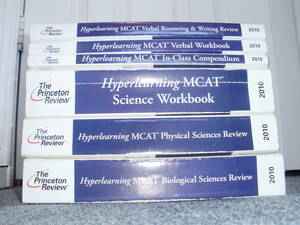When I'm old, I'll probably remember the summer of 2011 as a major turning point in my life. I began the month of May exhausted after 4 years of university. I had spent an obscene number of my waking moments thinking about, studying for and applying to medical school. It's a grueling process, partly because of the uncertainty of being rejected; what do you do then? Should you spend one, two, or even three more years reapplying? There's immense pressure to compete. For last year's class at McMaster, 3785 students applied and roughly 250 were sent offers of admission, with a final class size of 207.
I never thought that I'd actually make it, and I had little faith in myself as a student. I took the MCAT last summer, but for the first few days only studied a couple of hours per day. My practice test results were terrible. My thought process was: What's the point of studying hard when I won't get in anyways? Then, in early June I had a chance encounter with an old friend from high school at the movie theater, who told me that she studied for the MCAT every day from 9 to 11.
“Yeah, I do about 2 hours too,” I replied.
“No. 9 am to 11 pm,” she laughed.
That was perhaps one of the most important conversations I've had in my academic career. I was frustrated with my poor study habits already, but the conversation made me question myself deeply: why was I pursuing this goal in the first place if I was unwilling to even put in the work necessary to achieve it? I felt a sense of urgency to study. The next day I took my large stack of review books and studied from 9 am to 7 pm. I would take a break for an hour-long nap in the afternoon followed by lunch. This routine lasted consistently for the next 3 months, with just one day missed for an outing to Wonderland.
 |
| My stack of MCAT books. |
My new attitude was to do my best, even if I failed. In the month leading up to the exam, my practice tests were still below the cutoffs. But in the last two weeks I somehow managed to synthesize and absorb the material very efficiently, and I managed to do better on the MCAT than I had ever hoped.
My new attitude of "Try your best, even though you're not going to make it" carried me through a tough final year, long applications and several multiple mini interviews (which uses live actors to challenge applicants with realistic scenarios). In January, I was sitting in my Cell Bio class when a new message came in on my phone: a rejection from Queens for an interview. I felt shaken to my core and went back home. Lying on my bed a couple hours later, I checked my messages. Another email from Queens: Oops, sorry, we accidentally sent you a rejection. No, we'd actually like to invite you for an interview.
Phew! It turned out to be a technical glitch in Queens' computer system that affected hundreds of students and possibly caused a few heart attacks. Then came May 5th, the day when all the Ontario med schools inform applicants about whether they've been accepted or rejected. I woke up early, refreshed my Hotmail inbox and saw that I was accepted by Queens. Then Wendy Edge, admissions coordinator at McMaster, emailed me shortly thereafter with an offer of admission. I felt a deep sense of relief wash over me and a feeling that the last 4 years of work had been validated in an important way.
I also felt like the medical profession had swept me up into its arms and planted me firmly on my life's path. I could suddenly envision the next 40 years of my life; not the details, but the general contours. I would study for three years, do my residency and then pick a specialty that suited my interests and skills. After becoming accustomed to uncertainty, this sense of clarity was a welcome change.
After giving my parents a hug, I called my Indian grandparents, who were perhaps more excited than anyone else. My grandmother had made several offerings at the Temple to her Hindu gods so that I would be admitted. Once she heard the news, she walked around her apartment complex an hour away from New Delhi and handed out sweets. I also talked with my "Dadadji" or grandfather on the phone for several minutes. He had grown up in dire poverty, and was naturally very happy.
After achieving this goal, I could finally concentrate on my personal growth more. At times I felt empty; when a certain goal occupies so much of your life, it tends to knock out everything else that is there. Now that the dream was fulfilled, it was replaced by many questions: OK, so I'm going to be a doctor. Who cares? What's the point of any of this? Is this all there is to life?
Those questions inspired me to read “Man's Search for Meaning” by Viktor Frankl, a holocaust survivor, and it's no doubt one of the most important books that I've read. It's about taking responsibility for your own happiness and actively creating meaning in life. I also planned out a summer with ample opportunity for new experiences, new friends, and plenty of self-reflection. A combination of working for the Census, traveling to Colorado and doing the Explore program in Quebec has given me a welcome chance to develop personally. I have a long, long way to go. But with med school less than two weeks away, I feel ready to tackle this new stage of my life.
 |
| New friends |
